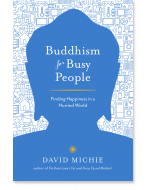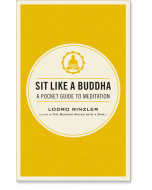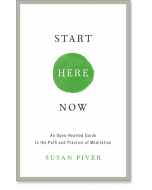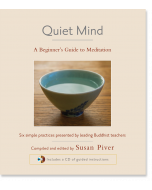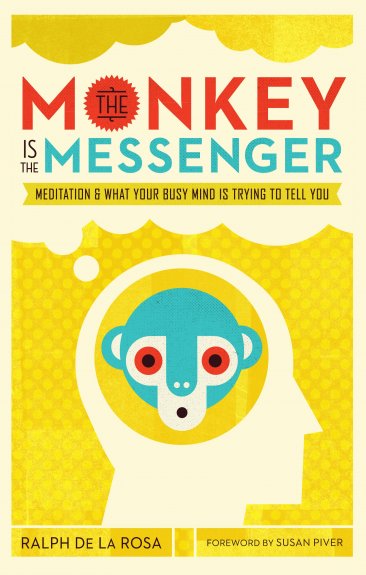The Monkey Is the Messenger
By Ralph De La Rosa
Foreword by Susan Piver
-
Amazon eBook Download
Privacy PolicyBefore you go, sign up to receive news & promotions from Shambhala.com
Apple eBook Download
Privacy PolicyBefore you go, sign up to receive news & promotions from Shambhala.com
Kobo eBook Download
Privacy PolicyBefore you go, sign up to receive news & promotions from Shambhala.com
Nook eBook Download
Privacy PolicyBefore you go, sign up to receive news & promotions from Shambhala.com
Shambhala Publications11/13/2018Pages: 288Size: 5.5 x 8.5ISBN: 9781611805840Details“My mind is so busy, I really need to meditate.”
“My mind is so busy, there’s no way I can meditate.”
Familiar dilemma? These days just about all of us know we should be meditating, but that doesn’t make it any easier to sit down and face the repetitive thoughts careening around our brains—seemingly pointless, sometimes hurtful, nearly always hard to control. Rather than quitting meditation or trying to wall off the monkey mind, Ralph De La Rosa suggests asking yourself a question: If you were to stop demonizing your monkey mind, would it have anything to teach you? In a roundabout way, could repetitive thoughts be pointing us in the direction of personal—and even societal—transformation?
Poignant and entertaining, The Monkey Is the Messenger offers a range of evidence-based, somatic, and trauma-informed insights and practices drawn from De La Rosa’s study of neuroscience and psychology and his long practice of meditation and yoga. Here at last—a remedy for all those who want to meditate but suppose they can’t because they think too much.ExtrasListen to the guided meditations accompanying The Monkey Is the Messenger.
RelatedCheck items to add to the cart orAuthor Bio
Ralph De La Rosa, LCSW, is a psychotherapist in private practice and a seasoned meditation instructor. He began practicing meditation in 1996 and has been teaching since 2008. He was a student of Amma’s (Mata Amritanandamayi) for sixteen years and began studying Buddhism in 2005. His work has been featured in the New York Post, CNN, GQ, SELF, Women’s Health, and many other publications and podcasts. He regularly leads immersive healing retreats at Omega Institute, Spirit Rock, and Kripalu. He is a summa cum laude graduate of Fordham University’s social work program and has trained in multiple forms of trauma-focused treatment including Internal Family Systems therapy (IFS) and Somatic Experiencing (SE).
Ralph himself is a depression, PTSD, and opiate addiction survivor. His work is inspired by the tremendous transformation he has experienced through meditation, yoga, and therapy. Susan Piver is an author and meditation instructor whose books include How Not to Be Afraid of Your Own Life, The Wisdom of a Broken Heart, and the New York Times best-seller The Hard Questions. She has appeared on Oprah, The Today Show, the CBS Early Show, The Tyra Banks Show, and other national television programs in connection with her books. She leads workshops and retreats around the country on living an awakened life.Praise
Susan Piver is an author and meditation instructor whose books include How Not to Be Afraid of Your Own Life, The Wisdom of a Broken Heart, and the New York Times best-seller The Hard Questions. She has appeared on Oprah, The Today Show, the CBS Early Show, The Tyra Banks Show, and other national television programs in connection with her books. She leads workshops and retreats around the country on living an awakened life.Praise"With a rare authenticity, Ralph De La Rosa seamlessly blends trauma theory and neuroscience into the framework of Buddhism. Reading this work will be deeply healing for so many people. If you have ever felt a little broken, pick up this book—it's the voice we all need to hear." —Lodro Rinzler, author of The Buddha Walks into a Bar
"Smart and sure to benefit many. Ralph De La Rosa’s book lovingly reframes the parts of us we'd rather avoid, especially our busy and anxious minds, as energies calling us toward a deeper awareness. A very useful contribution to the conversation between Buddhist psychology and Western psychology." —Ethan Nichtern, author of The Road Home
"Filled with humility and wit, curiosity and hope, this book offers those struggling against the currents of their own torment a path of least resistance back to the safe harbor of self-understanding and self-love." —Dr. Miles Neale, author of Gradual Awakening
"Everyone knows we should be meditating, but what if your thoughts just won’t shut up? Ralph De La Rosa draws on Buddhism, neuroscience and psychology to posit that instead of growing increasingly frustrated with these intrusive thoughts, we should accept them as a part of ourselves and use them as a tool to understand ourselves better." —BookPage
"Newcomers and readers familiar with meditation alike will enjoy De La Rosa’s compassionate perspective on the intersection of Buddhist practice and psychotherapy." —Publishers Weekly (starred review)
Selected Reader Reviews


